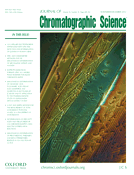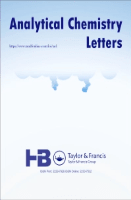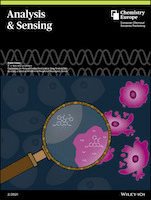
Talanta Open
Scope & Guideline
Empowering Research, Elevating Knowledge
Introduction
Aims and Scopes
- Analytical Chemistry and Method Development:
Research articles that explore novel techniques and methodologies for analytical chemistry, including spectroscopic, chromatographic, and electrochemical methods. - Sensor Technology and Biosensing:
Papers that focus on the development and application of sensors, including electrochemical, optical, and biosensors for detecting various analytes in environmental, clinical, and food samples. - Nanotechnology Applications:
Studies involving the synthesis and application of nanomaterials for enhanced sensing, detection, and analysis across various fields, including pharmaceuticals and environmental science. - Green Chemistry and Sustainability:
Research that emphasizes environmentally friendly practices in analytical chemistry, including the development of green extraction methods and sustainable materials. - Multidisciplinary Approaches:
Integration of various scientific disciplines such as biology, chemistry, and materials science to tackle complex analytical challenges.
Trending and Emerging
- Advanced Nanomaterials for Sensing:
There is an increasing focus on the use of advanced nanomaterials, such as carbon dots and metal-organic frameworks, for developing innovative sensors and enhancing detection capabilities. - Machine Learning and Data Analytics:
The integration of machine learning and artificial intelligence in analytical methods is on the rise, showcasing the potential for improving data analysis and interpretation in chemical sensing. - Point-of-Care Testing and Diagnostics:
Research is increasingly directed towards developing portable and rapid diagnostic devices for healthcare applications, emphasizing the importance of accessibility and real-time analysis. - Environmental Monitoring and Safety:
There is a growing emphasis on methodologies for environmental monitoring, particularly in the detection of pollutants and contaminants, aligning with global sustainability initiatives. - Microfluidics and Miniaturization:
The trend towards miniaturized analytical devices, particularly microfluidic platforms, is gaining momentum, reflecting the need for efficient and low-volume analysis in various applications.
Declining or Waning
- Traditional Analytical Techniques:
There has been a noticeable decrease in the publication of papers focusing solely on traditional analytical methods such as basic spectrophotometry and classical titrations, as the journal increasingly favors innovative and advanced methodologies. - Conventional Chemical Sensors:
Research centered around traditional sensor technologies is less frequent, with a shift towards more sophisticated and multifunctional biosensing systems that utilize nanotechnology. - Non-Green Practices:
Papers that do not incorporate principles of green chemistry or sustainability are becoming less common, reflecting a broader trend towards environmentally conscious research.
Similar Journals

JOURNAL OF ANALYTICAL CHEMISTRY
Catalyzing Progress in Analytical ChemistryJOURNAL OF ANALYTICAL CHEMISTRY, published by PLEIADES PUBLISHING INC, stands as a pivotal resource in the field of analytical chemistry, offering an innovative platform for researchers, professionals, and students to advance their knowledge and contribute to the discourse within the discipline. With an ISSN of 1061-9348 and an E-ISSN of 1608-3199, this journal features a focused exploration of analytical methodologies, instrumentation developments, and applications across various domains, contributing to practical and theoretical advancements in the field. Currently ranked in the Q3 category in Analytical Chemistry with a Scopus rank of #111 out of 156, it provides critical insights and innovation strategies for professionals aiming to enhance their analytical capabilities. Access to the journal is through standard subscription models, and it covers an extensive range of topics pertinent to the discipline from 1996 to 2024. Engage with the JOURNAL OF ANALYTICAL CHEMISTRY to be part of a vibrant research community dedicated to push the boundaries of analytical practices.

Chemical Methodologies
Empowering Researchers with Open Access to ChemistryWelcome to Chemical Methodologies, a premier journal published by SAMI PUBLISHING CO-SPC, dedicated to advancing the field of chemistry through innovative research and methodologies. With an ISSN of 2645-7776 and an E-ISSN of 2588-4344, this journal provides a vital platform for researchers and scholars to share their findings in areas encompassing physical, theoretical, and organic chemistry. Despite its initial HIndex and quartile rankings still being established, the journal's evolving impact within the academic landscape is underscored by its Scopus Ranks, which place it in the 35th percentile for physical and theoretical chemistry and the 33rd percentile for organic chemistry. Since its inception in 2022, and continuing through 2024, Chemical Methodologies aims to foster collaboration and knowledge dissemination among academics and practitioners alike, bridging theoretical concepts and practical applications. This open-access platform enhances accessibility for researchers and students worldwide, ensuring that groundbreaking contributions to chemical science reach a broad audience.

CHINESE JOURNAL OF ANALYTICAL CHEMISTRY
Exploring the Depths of Analytical ChemistryCHINESE JOURNAL OF ANALYTICAL CHEMISTRY, published by SCIENCE PRESS in China, stands as a prominent platform in the field of analytical chemistry since its inception in 1989. With its ISSN 0253-3820 and E-ISSN 1872-2040, the journal maintains a vital role in disseminating empirical research and innovative methodologies, contributing to the advancement of analytical techniques and their applications. The 2023 Scopus ranking positions the journal in the third quartile (Q3) within its category, reflecting a respectable standing among its peers. Researchers, professionals, and students alike engage with a broad range of topics, from instrumental analysis to environmental monitoring, each aiming to foster further scientific inquiry. Although it does not currently offer Open Access, the journal's rich repository of knowledge continues to be an essential resource for those in the analytical chemistry community, with an enduring commitment to scientific excellence and collaboration.

JOURNAL OF CHROMATOGRAPHIC SCIENCE
Connecting Scholars to the World of ChromatographyWelcome to the Journal of Chromatographic Science, a premier publication dedicated to advancing the scientific understanding of chromatographic techniques and their applications across various disciplines. Published by Oxford University Press Inc, this journal, with its ISSN 0021-9665 and E-ISSN 1945-239X, has been disseminating innovative research since 1963, serving as a vital resource for researchers, industry professionals, and academic scholars in the fields of Analytical Chemistry and Medicine. As evidenced by its 2023 Scopus ranking, the journal stands at the Q3 quartile in both its primary disciplines, highlighting its relevance and contribution to ongoing research. The journal promotes high-quality, peer-reviewed articles that aim to foster knowledge and encourage the practical application of chromatographic science. While it operates under a traditional subscription model, the valuable insights it offers are essential for those seeking to enhance their expertise and stay at the forefront of chromatographic methodologies. Join our community of scholars as we explore the complexities and innovations in chromatographic science, paving the way for future discoveries.

Acta Chemica Iasi
Connecting Ideas, Transforming ChemistryActa Chemica Iasi is a distinguished open-access journal dedicated to advancing the field of chemistry, published by the esteemed ALEXANDRU IOAN CUZA UNIVERSITY PRESS located in Iasi, Romania. Since its inception, this journal has served as a vital platform for the dissemination of significant research findings, theoretical advancements, and methodological innovations in various chemistry disciplines. As an open-access publication since 2013, it provides unrestricted access to high-quality articles, fostering collaboration and knowledge sharing among researchers, professionals, and students globally. Although specific metrics such as H-Index and Scopus rankings may be forthcoming, the journal's commitment to rigor and excellence ensures that it remains an invaluable resource for those seeking to stay at the forefront of chemical research. With a focus on promoting scientific inquiry and innovation, Acta Chemica Iasi continues to uphold a legacy of scholarly excellence and contribution to the chemical sciences.

Journal of the Iranian Chemical Society
Fostering Collaboration for a Brighter Chemical FutureThe Journal of the Iranian Chemical Society, published by SPRINGER, is a prominent academic journal dedicated to advancing the field of chemistry. With an ISSN of 1735-207X and an E-ISSN of 1735-2428, this quarterly journal has been contributing valuable research from 2006 to 2024. Situated in Germany, it serves as a vital platform for chemists and researchers to disseminate their findings, particularly within the miscellaneous chemistry category, where it ranks in the Q3 quartile for 2023. Despite its current lack of open access options, the journal maintains a solid presence in the academic community, evidenced by its Scopus ranking of #165 out of 408 in general chemistry and a commendable 59th percentile. The journal's objective aims to foster innovation and collaboration in chemical research, making it an essential resource for professionals and students keen on pioneering developments in the field. As a subscriber, you will gain insights into cutting-edge research that drives the future of chemistry.

Analytical Chemistry Letters
Catalyzing Collaboration Across Scientific DisciplinesAnalytical Chemistry Letters is a notable journal published by Taylor & Francis Ltd, focusing on the interdisciplinary aspects of analytical chemistry and its applications across various fields, including materials science and forensic medicine. With an ISSN of 2229-7928 and an E-ISSN of 2230-7532, this journal provides researchers and professionals a platform to share their findings from 2011 to 2024, fostering advancements in methodologies and technologies. Despite being classified in the Q3 and Q4 category quartiles across multiple disciplines, the journal is crucial for emerging studies and discussions, particularly in the context of innovative analytical techniques and their relevance to real-world challenges. While currently not an open-access journal, its rigorous peer-review process ensures high-quality contributions that are essential for academics, professionals, and students keen on bridging theory and practice. The journal continues to build its reputation, reflected in its Scopus rankings which place it amidst a competitive landscape, encouraging growth and collaboration within the scientific community.

Analysis & Sensing
Advancing the Frontiers of Analytical ScienceAnalysis & Sensing is a prominent academic journal published by WILEY-V C H VERLAG GMBH, focusing on the critical fields of Analytical Chemistry, Electrochemistry, Spectroscopy, and Biochemistry. Established within the converged years from 2021 to 2024, the journal aims to advance knowledge in analytical and sensing techniques, providing a platform for high-quality research that reflects current trends and challenges in the scientific community. With a Scopus ranking that highlights its credibility—ranking 101st in Analytical Chemistry and 43rd in Electrochemistry—the journal caters to researchers, professionals, and students striving to enhance their understanding of analytical processes and methodologies. Although not open access, the quality of the articles published ensures a rigorous peer-review system, making it a vital resource for those who wish to remain at the forefront of research innovation in analytical sciences. Additionally, its global reach, indicated by its effective dissemination and relevance, underscores the journal's significance within the realm of chemical research.

CHEMICAL JOURNAL OF CHINESE UNIVERSITIES-CHINESE
Elevating Scholarly Dialogue in Chemistry.CHEMICAL JOURNAL OF CHINESE UNIVERSITIES-CHINESE, published by Higher Education Press, serves as a vital platform for advancing research in the field of chemistry. With a history dating back to 1996, this journal has evolved to encompass a wide range of topics fundamental to the chemistry community, catering to both applied and theoretical perspectives. Although classified in Quartile 4 within the broader chemistry category, it remains a significant contributor to the knowledge base, ranking 281st out of 408 journals in the general chemistry category according to Scopus. Positioned in Beijing, China, the journal aims to foster collaboration among researchers and professionals while disseminating innovative research and developments. By promoting open exchange of ideas in chemistry, it strives to elevate the scholarly dialogue and contribute to ongoing education for students and professionals alike, with its content accessible through institutional subscriptions.

ANALYTICAL AND BIOANALYTICAL CHEMISTRY
Driving Excellence in Bioanalytical MethodologiesANALYTICAL AND BIOANALYTICAL CHEMISTRY, published by SPRINGER HEIDELBERG, is a leading international journal that serves as a vital platform for innovative research in the fields of analytical and bioanalytical chemistry. With an impressive impact factor and ranking in the Q2 category for both Analytical Chemistry and Biochemistry, the journal highlights key advancements and methodologies that drive the discipline forward. Established in 1996 and continuing vigorously into 2024, it has gained significant recognition with Scopus rankings placing it in the 83rd and 78th percentiles within its categories, underscoring its impact and relevance. The journal's commitment to open access facilitates widespread dissemination of critical scientific knowledge, making it an essential resource for researchers, professionals, and students dedicated to exploring the complexities of chemical analysis. With its base in Heidelberg, Germany, ANALYTICAL AND BIOANALYTICAL CHEMISTRY continues to inspire and influence the global research community.